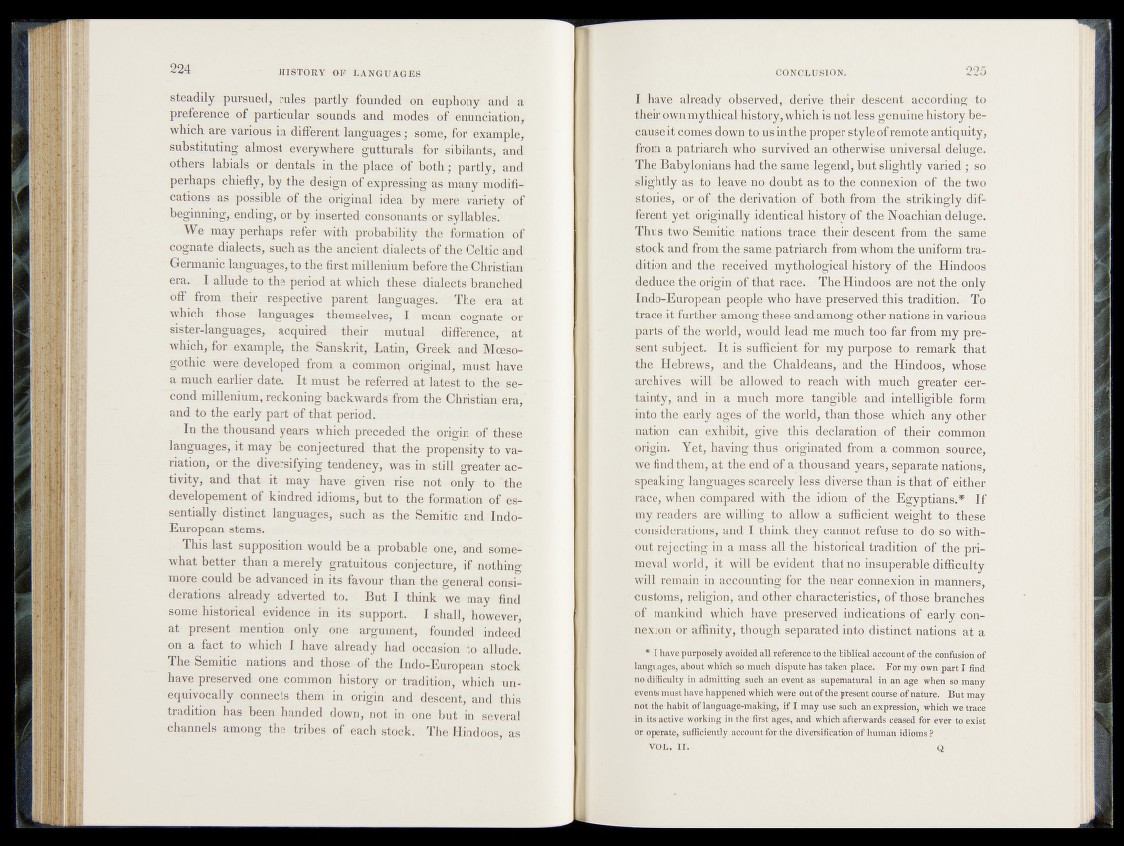
steadily pursued, rules partly founded on euphony and a
preference of particular sounds and modes of enunciation,
which are various in different languages; some, for example,
substituting almost everywhere gutturals for sibilants, and
others labials or dentals in the place of both; partly, and
perhaps chiefly, by the design of expressing as many modifi*-!
cations as possible of the original idea by mere variety of
beginning, ending, or by inserted consoriants or syllables.
We may perhaps refer with probability the formation 6f
cognate dialects, such as the ancient dialects of the Celtic and
Germanic languages, to the first millenium before the Christian
era. I allude to the period at which these dialects branched
off from their respective parent languages. "The era at
which those languages themselves^ I mean cognate or
sister-languages, acquired their mutual difference, at
which, for example, the. Sanskrit, Latin, Greek and Mceso-
gothic were developed from a cornmoq, original, must have
a much earlier date. It must be referred at latest to the?'second
millenium, reckoning backwards"#om the Christian era,'
and to the early part of that period.
In the thousand years which preceded the origin' of these
languages, it may be conjectured that the-propensity to variation,
or the diversifying tendency, was in still greater activity,
and that it may have-given rise not only to 'the
developement of kindred idioms, but to the formation of essentially
distinct languages, such as the Semitic and Indo^
European stems.
This last supposition would be a probable one, and somewhat
better than a merely gratuitous conjecture, if nothing
more could be advanced in its favour than the general considerations
already adverted to. But I think we may find
some historical evidence in its support. I shall, however,
at present mention, only one argument, founded indeed
on a fact to which I have already had occasion to allude.
The Semitic nations and those of the Indo-European stock
have preserved one common history or tradition, which unequivocally
connects them in origin and descent, and this
tradition has been handed down, not in one but in several
channels among the tribes of each stock. The Hindoos, as
I have already observed, derive their, descent according to
their oyramythical history, which is not less genuine history because
it comes down to us in the proper style of remote antiquity,
from a patriarch who .survived an otherwise' universal deluge.
The Babylonians had. the same .legend,- but slightly varied ; so
slightly, as to leave no-doubt as to.the connexion of the two
Stories, or of the derivation of both from , the strikingly, different
yet originally identical history of. theilioachian deluge.
Thus two Semitic nations1 tracel their descent from the same
stock and from the .same patriarch from.whom the uniform tradition
and the received mythological history off the Hindoos
deduce the origin}of that race.. The Hindoos are not theionly
Indo-European people who have preserved this tradition.“- To
trace it.further among those andamong other nations in various
parts of the world, would lead me much too far from my present
subject. It is sufficient for my purpose vtoj remark that
the Hebrews, and the Chaldeans, and the Hindoos, V«hpse
archives will, be allowed to reach with much greater certainty,/
»and in a much more, tangible and .intelligible, form
into t^e early ages of the world, than those which any other
nation can exhibit, give this declaration, of their common
origin. Yet, having thus, originated from a common-source,
we find them, at the end of a thousand years,.separate nations,
speaking languages scarcely less diverse than is that of Either
race, when compared with the idiom of the Egyptians.* If
my readers are willing to allow a sufficient weight to these
considerations, and I think they cannot refuse to do so1 without
rejecting in a mass all the historical tradition of the primeval
world, it will be evident that no insuperable difficulty *
will remain in accounting for the near connexion in manners,
customs, religion, and other characteristic^ of those branches'
of mankind which have preserved indications of e^rly^pri-,
nexion or affinity, though separated into, distinct nations at a
* I have purposely avoided all reference to the biblical account of the confusion of
languages, about which so much dispute has taken place. For hay; own part I find
no difficulty in admitting such an event as supernatural in an age when so many
events must have happened which were out of the present course of nature. But may
not the habit of language-making, if 1 may use such an expression, which we trace
in its active working in the first ages, and which afterwards ceased for ever to exist
or operate, sufficiently account fot the diversification of human idioms ?